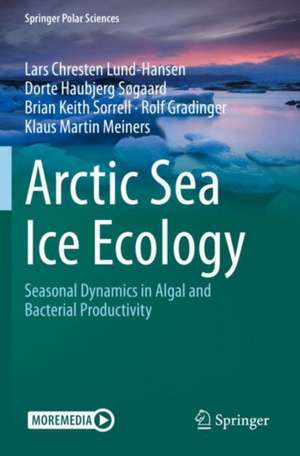Arctic Sea Ice Ecology: Seasonal Dynamics in Algal and Bacterial Productivity: Springer Polar Sciences
Autor Lars Chresten Lund-Hansen, Dorte Haubjerg Søgaard, Brian Keith Sorrell, Rolf Gradinger, Klaus Martin Meinersen Limba Engleză Paperback – 9 aug 2021
This book will appeal to university students at Masters or PhD levels reading biology, geosciences, and chemistry.
| Toate formatele și edițiile | Preț | Express |
|---|---|---|
| Paperback (1) | 445.28 lei 38-44 zile | |
| Springer International Publishing – 9 aug 2021 | 445.28 lei 38-44 zile | |
| Hardback (1) | 500.03 lei 38-44 zile | |
| Springer International Publishing – 8 aug 2020 | 500.03 lei 38-44 zile |
Din seria Springer Polar Sciences
- 18%
 Preț: 735.18 lei
Preț: 735.18 lei - 18%
 Preț: 798.81 lei
Preț: 798.81 lei - 18%
 Preț: 1123.50 lei
Preț: 1123.50 lei - 18%
 Preț: 730.97 lei
Preț: 730.97 lei - 20%
 Preț: 752.13 lei
Preț: 752.13 lei - 18%
 Preț: 952.09 lei
Preț: 952.09 lei - 15%
 Preț: 643.34 lei
Preț: 643.34 lei - 15%
 Preț: 640.06 lei
Preț: 640.06 lei - 18%
 Preț: 1142.28 lei
Preț: 1142.28 lei - 20%
 Preț: 691.01 lei
Preț: 691.01 lei - 18%
 Preț: 889.29 lei
Preț: 889.29 lei - 15%
 Preț: 642.68 lei
Preț: 642.68 lei - 20%
 Preț: 694.16 lei
Preț: 694.16 lei -
 Preț: 430.59 lei
Preț: 430.59 lei - 15%
 Preț: 700.94 lei
Preț: 700.94 lei - 24%
 Preț: 1059.33 lei
Preț: 1059.33 lei - 24%
 Preț: 715.30 lei
Preț: 715.30 lei - 23%
 Preț: 635.55 lei
Preț: 635.55 lei -
 Preț: 357.25 lei
Preț: 357.25 lei - 18%
 Preț: 953.03 lei
Preț: 953.03 lei - 18%
 Preț: 779.57 lei
Preț: 779.57 lei - 15%
 Preț: 690.76 lei
Preț: 690.76 lei -
 Preț: 382.50 lei
Preț: 382.50 lei - 18%
 Preț: 949.55 lei
Preț: 949.55 lei -
 Preț: 352.63 lei
Preț: 352.63 lei - 18%
 Preț: 943.57 lei
Preț: 943.57 lei
Preț: 445.28 lei
Nou
Puncte Express: 668
Preț estimativ în valută:
85.20€ • 89.20$ • 70.50£
85.20€ • 89.20$ • 70.50£
Carte tipărită la comandă
Livrare economică 01-07 aprilie
Preluare comenzi: 021 569.72.76
Specificații
ISBN-13: 9783030374747
ISBN-10: 3030374742
Pagini: 178
Ilustrații: XIV, 178 p. 130 illus., 103 illus. in color.
Dimensiuni: 155 x 235 mm
Ediția:1st ed. 2020
Editura: Springer International Publishing
Colecția Springer
Seria Springer Polar Sciences
Locul publicării:Cham, Switzerland
ISBN-10: 3030374742
Pagini: 178
Ilustrații: XIV, 178 p. 130 illus., 103 illus. in color.
Dimensiuni: 155 x 235 mm
Ediția:1st ed. 2020
Editura: Springer International Publishing
Colecția Springer
Seria Springer Polar Sciences
Locul publicării:Cham, Switzerland
Cuprins
Chapter 1. The Book, and Ecology of Sea Ice.- Chapter 2. Autumn, Development and Consolidation of Sea Ice.- Chapter 3. Winter, Cold and Mature Sea Ice.- Chapter 4. Spring, Summer and Melting Sea Ice.- Chapter 5. Sea Ice in a Climate Change Context.- Chapter 6. Methods and Techniques in Sea Ice Ecology.
Notă biografică
The author group consists of well-known researchers with individual expertise’s in sea ice ecology. They are all employed at universities and research centers and have a long-term record of sea ice research and fieldwork in Polar regions.
Textul de pe ultima copertă
The book on sea ice ecology is the ecology of sea ice algae and other microorganism as bacteria, meiofauna, and viruses residing inside or at the bottom of the sea ice, called the sympagic biota. Organisms as seals, fish, birds, and Polar bears relies on sea ice but are not part of this biota. A distinct feature of this ecosystem, is the disappearance (melt) every summer and re-establishing in autumn and winter. The book is organized seasonally describing the physical, optical, biological, and geochemical conditions typical of the seasons: autumn, winter, and spring. These are exemplified with case studies based on author’s fieldwork in Greenland, the Arctic Ocean, and Antarctica but focused on Arctic conditions. The sea ice ecosystem is described in the context of climate change, interests, and effects of a decreasing summer ice extent in the Arctic Ocean. The book contains an up to date description of most relevant methods and techniques applied in sea ice ecology research.
This book will appeal to university students at Masters or PhD levels reading biology, geosciences, and chemistry.
This book will appeal to university students at Masters or PhD levels reading biology, geosciences, and chemistry.
Caracteristici
Unique textbook on sea ice ecology and Arctic marine ecology Offers specialized teachings to higher level university and PhD students Focus on sea ice in a global context and climate changes in the Arctic
